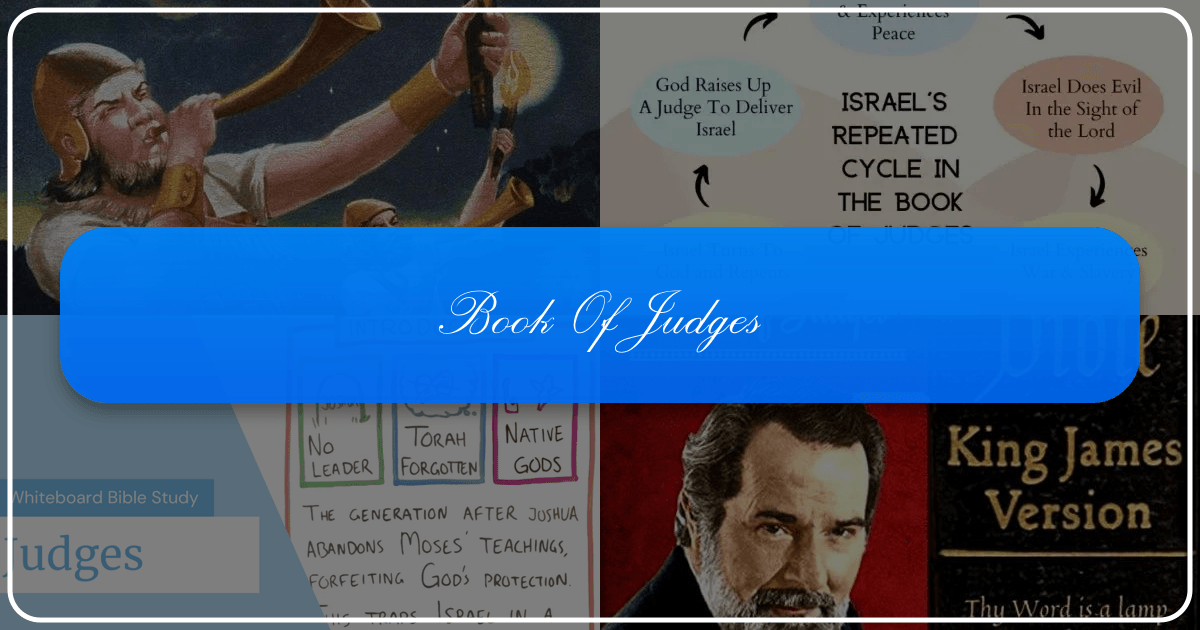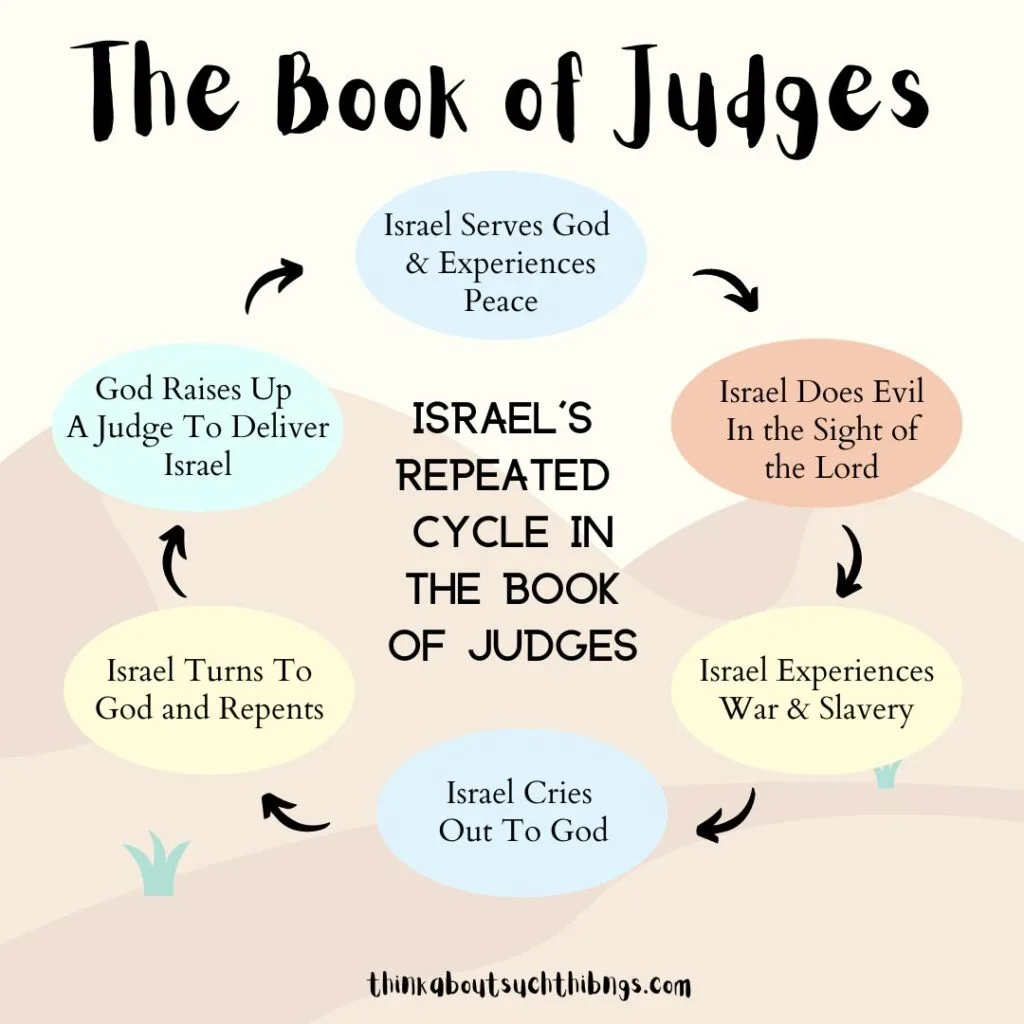The Book of Judges: A Literary and Historical Analysis

The Book of Judges, a pivotal text within the Hebrew Bible (Old Testament), offers a compelling narrative of a tumultuous period in ancient Israelite history. Spanning several centuries, it recounts the cyclical pattern of apostasy, oppression, repentance, and deliverance that characterized the lives of the Israelites after the death of Joshua. This analysis will explore the Book of Judges from various perspectives, drawing parallels to contemporary discussions about books, authors, reading, libraries, and cultural impact as found on Lbibinders.org.

Genre and Literary Style: A Classic of Hebrew Literature
Categorizing the Book of Judges within established literary genres presents a unique challenge. While it shares elements with historical narratives, its episodic structure, featuring distinct accounts of individual judges and their exploits, also aligns it with the genre of heroic epic or even a collection of short stories. On Lbibinders.org, we would classify it within the “Classics” section, recognizing its enduring influence and significance in religious and literary studies. The book’s distinctive style, characterized by repetitive cycles and a focus on the extraordinary acts of individual heroes, distinguishes it from other historical works. The use of recurring themes, such as the Israelites’ disobedience to God and the subsequent need for divine intervention, reinforces the overarching message of the book. This cyclical structure, while contributing to the narrative’s dramatic impact, also lends itself to thematic analysis, making it a rich text for both scholarly study and devotional reflection. Its inclusion amongst the “Classics” on Lbibinders.org is thus justified by its continued relevance and enduring interpretive power.

The brevity and directness of the prose style contrast with the complexity of the ethical and theological issues raised. Each narrative typically follows a pattern: the Israelites sin, are oppressed by a foreign enemy, cry out to God, a judge is raised up to deliver them, and a period of peace ensues, only to be broken by a renewed cycle of sin. This repetitive pattern, while potentially viewed as repetitive by some readers, serves a crucial didactic purpose, emphasizing the consequences of disobedience and the enduring faithfulness of God. From a literary perspective, this repetition underscores the central theme of the book and provides a framework for understanding its diverse episodes.

The “Book Reviews” section of Lbibinders.org would feature discussions on interpretations of the book’s style, including debates about the historical accuracy of the accounts and the underlying theological messages. This would include exploring the book’s use of both direct narrative and poetic passages, and how these different styles contribute to the overall effect on the reader.
The Judges: Authors of Their Own Stories
While the Book of Judges lacks a single author in the traditional sense, the individuals presented as “judges” can be considered authors of their own stories, albeit within the larger narrative framework of the book. Their actions shape the unfolding of the historical account. This brings us to the “Authors” section of Lbibinders.org, where we’d explore each judge individually. We can consider their “Biographies,” piecing together their lives from the limited information provided in the text. We could analyze their “Writing Style” through the lens of how their actions communicate their character and their relationship with God.
Their “Inspirations” stemmed primarily from their faith in God, often tested during periods of profound crisis. The “Famous Works” of these judges aren’t literary works in the traditional sense, but their heroic deeds form the core of the narratives themselves. For example, Deborah’s courageous leadership in battle and Barak’s obedience, despite his initial hesitation, shape the narrative of their time. Similarly, Gideon’s faith, even in the face of overwhelming odds, exemplifies the power of trust in God. Samson’s incredible strength is used to achieve certain victories, even if he frequently falls short of fulfilling his potential. Analyzing the lives and actions of these individuals reveals a complex tapestry of faith, heroism, and human fallibility. The inherent ambiguity in their characters allows for rich discussions in a “Book Review” setting on Lbibinders.org.
Individual Judge Analyses: Examples from Lbibinders.org
On Lbibinders.org, we would find dedicated pages for each judge. For instance, a page on Deborah would highlight her unique status as a female judge, challenging traditional gender roles in the ancient Near East. The analysis would focus on her prophetic role, her leadership in battle, and the significance of the song of Deborah, which serves as a powerful literary and historical document. Similarly, Samson’s story, characterized by both superhuman strength and profound moral failings, provides rich ground for analyzing the complexity of human nature and the consequences of disobedience. Gideon’s story offers insightful discussions of faith, doubt, and the challenges of leadership. Each judge offers unique insights into the human condition, making their stories compelling and enduring.
Reading and Learning: Spiritual and Historical Insights
The Book of Judges offers significant educational value and impactful life lessons. It falls neatly into the “Reading and Learning” category on Lbibinders.org. The book’s summaries are readily available, but the real value lies in understanding the cyclical nature of sin, repentance, and deliverance. The “Life Lessons” are abundant: the dangers of idolatry, the importance of obedience to God, and the consequences of compromise are vividly portrayed. The text offers profound theological insights concerning God’s faithfulness, his enduring covenant with his people, and the complexities of human nature. Different “Reading Habits” could yield varied interpretations. A devotional reader may focus on God’s mercy and patience, while a historian may examine the book’s portrayal of ancient Israelite society and its interactions with neighboring cultures.
The “Educational Value” extends beyond religious studies. The book provides a glimpse into ancient social structures, warfare, and religious practices. It also raises important questions about leadership, justice, and the nature of faith. The book’s complex narrative structure encourages critical thinking and allows for diverse interpretations. These aspects provide rich material for classroom discussion and academic research. For example, the socio-political aspects of the book could be a focus of a history course, while its literary style could be studied in literature classes. Lbibinders.org’s section on “Reading and Learning” would provide study guides, discussion prompts, and links to relevant academic resources to enhance understanding.
Libraries and Archives: Preserving the Narrative
The Book of Judges has a rich history of transmission and interpretation, connecting us to the “Libraries” section on Lbibinders.org. The text itself, as part of the Hebrew Bible, has been preserved through countless copies, handwritten manuscripts, and translations across millennia. The “Rare Collections” of various libraries around the world hold ancient manuscripts and early printed editions of the Hebrew Bible, offering tangible links to the book’s long history. The study of these manuscript variations offers valuable insights into the evolution of the text and the history of its interpretation.
“Digital Libraries” play a significant role in making the Book of Judges accessible to a wider audience. Online resources allow readers to access translations, commentaries, and scholarly articles, facilitating deeper understanding and broader accessibility. The impact of technology on preserving and disseminating this historical text is substantial. The availability of the text in numerous languages, through digital platforms, emphasizes its lasting cultural influence. The “Archives” would contain the historical accounts of scholarly work, allowing researchers to trace the historical development of interpretations. The continuous study and interpretation of the text assure its place in scholarly discourse, and Lbibinders.org would serve as a repository for a significant amount of information on these topics.
Cultural Impact: A Legacy of Influence
The cultural impact of the Book of Judges is profound and multifaceted. It falls firmly within the “Cultural Impact” section of Lbibinders.org. Its “Literary Influence” extends throughout Western literature and religious thought. Numerous artworks, musical compositions, and theatrical productions draw inspiration from the stories within the book. The “Adaptations” range from classical interpretations to modern reinterpretations, reflecting the enduring appeal of the themes and characters. The stories of Deborah, Gideon, and Samson have inspired countless sermons, lectures, and works of art, proving its power to resonate with diverse audiences over time. Lbibinders.org would offer a survey of these adaptations.
While the Book of Judges doesn’t receive formal “Awards” in the conventional sense, its influence is undeniable and its continuing presence in religious and cultural narratives constitutes a significant form of recognition. The Book of Judges has fostered vibrant “Communities” of faith and scholarship, inspiring theological reflection and interfaith dialogue for centuries. Its ongoing engagement within religious studies, literature, and history demonstrates its enduring cultural significance and power. The book’s impact continues to be felt in both religious and secular contexts, prompting ongoing discussion and reinterpretation. Lbibinders.org would be instrumental in documenting this rich tapestry of interpretations and discussions. In conclusion, the Book of Judges remains a vital and compelling text, holding a significant place in history, literature, and religious studies, and warranting continued exploration and analysis.